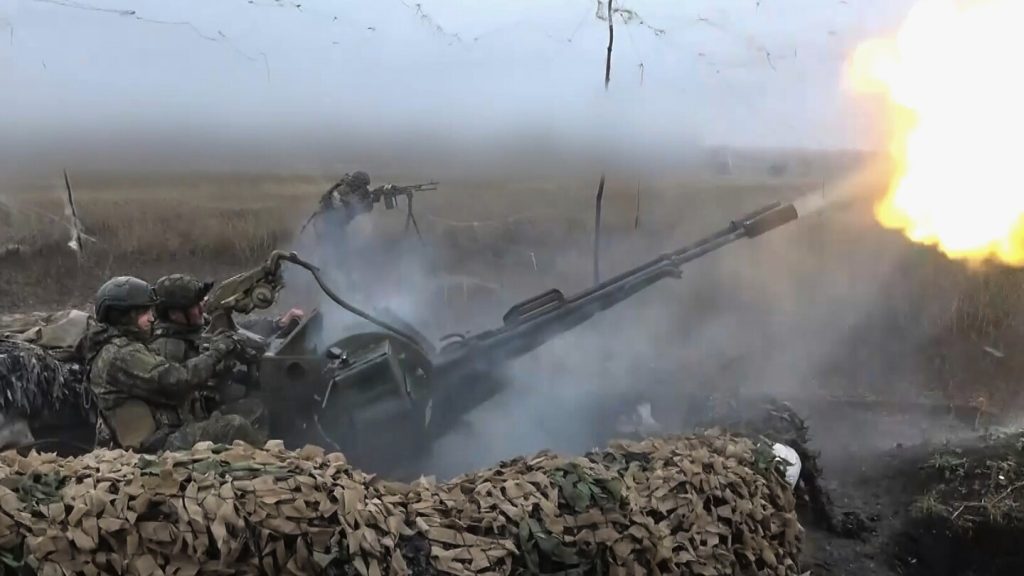Listen to the article
Ukrainian drone strikes disrupted power and heating to two major Russian cities near the Ukrainian border on Sunday, as the two nations continue their almost daily exchanges of attacks on critical energy infrastructure.
In Voronezh, a city with over one million residents, a Ukrainian drone strike temporarily caused blackouts and heating outages, according to regional Governor Alexander Gusev. Several drones were electronically jammed overnight, triggering a fire at a utility facility that was quickly extinguished. Russian and Ukrainian Telegram channels reported that the strike targeted a local thermal power plant.
Belgorod also suffered “serious damage” to its power and heating systems following a missile strike late Saturday, affecting approximately 20,000 households, local Governor Vyacheslav Gladkov said. Additionally, authorities in the Rostov region reported hours-long blackouts in Taganrog, a city of around 240,000 people, attributing the outages to an emergency shutdown of a power line.
Russia’s defense ministry claimed its forces had intercepted or destroyed 44 Ukrainian drones over the Bryansk and Rostov regions during the night. However, the statement notably omitted any mention of the Voronezh or Belgorod provinces, nor did it specify the total number of drones Ukraine had launched.
These escalating attacks come amid a prolonged conflict now approaching its fourth year, with diplomatic efforts to end the war showing little progress. For months, Ukraine has conducted long-range drone strikes on Russian refineries, aiming to undermine Moscow’s oil export revenue that finances its war effort. Meanwhile, Kyiv and its Western allies accuse Russia of deliberately targeting Ukrainian power infrastructure to deprive civilians of essential services during the harsh winter months—a strategy Ukrainian officials describe as “weaponizing” the cold.
Ukraine’s Foreign Minister Andrii Sybiha raised alarm about Friday’s Russian missile and drone strikes, claiming they hit power substations supplying two of Ukraine’s nuclear power plants. “Russia once again targeted substations that power the Khmelnytskyi and Rivne nuclear power plants,” Sybiha stated on X. “These were not accidental but well-planned strikes. Russia is deliberately endangering nuclear safety in Europe.”
Sybiha called for an urgent meeting of the International Atomic Energy Agency’s board of governors to address these risks. The attacks have intensified scrutiny over the Ukrainian Energy Ministry’s apparent failure to adequately protect critical energy facilities near nuclear sites, according to several officials who spoke with the Associated Press.
Nuclear tensions have also increased following Russian President Vladimir Putin’s recent order to prepare plans for a possible nuclear test. Russian Foreign Minister Sergey Lavrov confirmed on Saturday that work has begun on Putin’s directive, which came after statements from U.S. President-elect Donald Trump that appeared to suggest Washington might resume its own nuclear testing program after a three-decade hiatus.
Despite these developments, Kremlin spokesman Dmitry Peskov affirmed on Sunday that Russia would honor its obligations under the global nuclear test ban. “Putin has repeatedly said that Russia is committed to its obligation to end nuclear tests, and that we have no intention of conducting them,” Peskov told reporters. He clarified that Russia would only consider resuming tests if the United States did so first.
In another diplomatic development, Lavrov expressed readiness to meet with incoming U.S. Secretary of State Marco Rubio to discuss the Ukraine conflict and improve bilateral relations. “Secretary of State Marco Rubio and I understand the need for regular communication,” Lavrov told Russia’s Ria state agency. This statement comes weeks after efforts to organize a summit between Russian and U.S. leaders were suspended.
Lavrov reiterated Russia’s position that peace cannot be achieved without “taking Russian interests into account,” language Moscow typically employs to signal its unwavering stance on its demands regarding Ukraine.
As winter sets in across Eastern Europe, the targeting of energy infrastructure on both sides of the conflict highlights how the war has evolved into a battle of attrition that continues to affect millions of civilians across the region.
Fact Checker
Verify the accuracy of this article using The Disinformation Commission analysis and real-time sources.




11 Comments
These tit-for-tat attacks on power and heating facilities are alarming. Civilians should not be caught in the crossfire of this conflict. I hope both sides can find a way to de-escalate tensions.
It’s distressing to see reports of Ukrainian drone strikes hitting Russian cities and disrupting essential services like power and heating. The humanitarian toll on civilians is deeply concerning.
The disruption of power and heating services in Russian cities is a concerning development. While the military aims are unclear, the humanitarian impact on ordinary people is deeply worrying.
I agree. Targeting civilian infrastructure, even indirectly, is a dangerous escalation that could prolong the suffering of those not directly involved in the fighting.
These attacks on power and heating facilities in Russian cities seem designed to ratchet up pressure and retaliation. I wonder how this will impact the broader dynamics of the war.
Indeed, this is an alarming development. Disrupting basic services like electricity and heat could have severe consequences for civilians caught in the middle of this conflict.
It’s concerning to see reports of Ukrainian drone strikes hitting Russian cities. While the military objectives are unclear, the impact on civilians is deeply troubling.
You raise a good point. Attacks on civilian infrastructure, even if intended for military targets, often end up harming innocent people the most. This cycle of retaliation has to stop.
These attacks on power and heating facilities in Russian cities are a troubling development. While the military objectives may be unclear, the impact on civilians is deeply worrying and should be condemned.
Disrupting critical infrastructure like power and heating is a concerning escalation in the conflict. Both sides seem to be targeting civilian utilities, which raises worrying humanitarian issues.
You’re right, this tit-for-tat targeting of civilian systems is deeply troubling. It only serves to prolong the suffering of ordinary people caught in the crossfire.